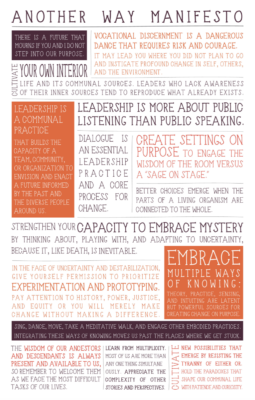
When I was a student in both high school and college, I was pretty good at making “study sheets.” In a way, they were “cheat sheets” that helped me to distill what I saw as most crucial points to remember and to integrate. I had rather neat and tiny printing. I used different colors to distinguish ideas and important principles. I didn’t know it then, but a big part of me learned visually. I could remember it more when I could see it, particularly when I written some of it down.
The folks at Forum for Theological Exploration that I wrote about a few days ago, using their C.A.R.E. model (create hospitable space; ask self-awakening questions; reflect theologically; enact the next most faithful step) have created a tremendous study sheet, harvesting from their journey of learning in invoking participative leadership in faith communities. They call it a manifesto, pictured above, for conditions to create Another Way.
Enjoy these statements — my tail wags when I see such tight, yet imaginative distilling of principles that guide a whole mess of us in the mess of being better humans together. And then pick one and go do, or be, something useful with it.
In no particular order:
- There is a future that mourns if you and I do not step into our purpose.
- Vocational discernment is a dangerous dance that requires risk and courage. It may lead you where you did not plan to go and instigate profound change in self, others, and the environment.
- Cultivate your own interior life and its communal sources. Leaders who lack awareness of the inner sources tend to reproduce what already exists.
- Leadership is more about public listening than public speaking.
- Leadership is a communal practice that builds the capacity of a team, community, or organization to envision and enact a future informed by the past and the diverse people around us.
- Dialogue is an essential leadership practice and a core process for change.
- Create settings on purpose, to engage wisdom of the room versus a “sage on the stage.”
- Better choices emerge when the parts of a living organism are connected to the whole.
- Strengthen your capacity to embrace mystery by thinking about, playing with, and adapting to uncertainty, because it, like death, is inevitable.
- Embrace multiple ways of knowing: theory, practice, sensing, and intuiting are latent but powerful sources for creating change on purpose.
- If you face uncertainty and destabilization, give yourself permission to prioritize experimentation and prototyping. Pay attention to history, power, justice, and equity or you will merely make change without making a difference.
- Sing, dance, move, take a meditative walk, and engage other embodied practices. Integrating these ways of knowing moves us past the places where we get stuck.
- The wisdom of our ancestors and descendants is always present and available to us, so remember to welcome them as we face the most difficult tasks of our lives.
- Learn from multiplicity. Most of us are more than on thing simultaneously. Appreciate the complexity of other stories and perspectives.
- Cultivate new possibilities that energy by resisting the tyranny of either / or. Hold the paradoxes that shape our communal life with patience and curiosity.
Is your tail wagging now?
